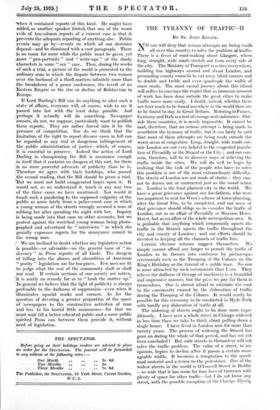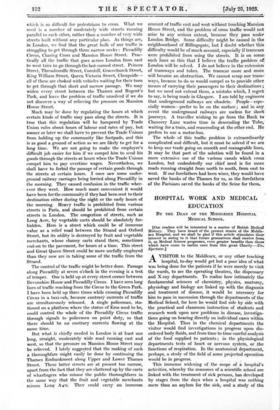THE TYRANNY OF TRAFFIC---II
BY ST. JOIIN ERVINE.
NO one will deny that serious attempts are being made all over this country to solve the problem of traffic. There is a fever of road-making about Glasgow, where long, straight, wide roads stretch out from every side of the city. The Ministry of Transport is active everywhere, building fine highways around and about London, and persuading county councils to cut away blind corners and to double and treble and even quadruple the width of main roads. The most casual journey about this island will suffice to convince the reader that an immense amount of work has been done outside the great cities to make traffic move more easily. I doubt, indeed, whether there are finer roads to be found anywhere in the world than are to be found to-day in Great Britain. Motoring in France, Germany and Italy is a test of courage and endurance. Out- side these countries, it is nearly impossible. It cannot be said, therefore, that no serious attempt is being made to overthrow the tyranny of traffic, but it can fairly be said that most of these attempts are being made outside the worst areas of congestion. Long, straight, wide roads out- side London are not very helpful to the congested popula- tion of Piccadilly or the Strand or the City ; and our con- cern, therefore, will be to discover ways of relieving the traffic inside the cities. We will do well to begin by realizing that the task of the people who have to solve this problem is one of the most extraordinary difficulty. The streets of London are not made of elastic : they can not be drawn out or contracted just as the mood seizes us. London is the least-planned city in the world. We have a great grievance against our forefathers, who were too impatient to wait for Wren's scheme of town-planning, after the Great Fire, to be completed, and our sense of that grievance should oblige us to consider the traffic of London, not as an affair of Piccadilly or Mansion House Street, but as an affair of the whole metropolitan area. It is probable that anything which temporarily upsets the traffic in the Strand, upsets the traffic throughout the city and county of London ; and our efforts should be devoted to keeping all the channels of traffic free.
Certain obvious reforms suggest themselves. We simply cannot afford any longer to permit the traffic of London to be thrown into confusion by picturesque ceremonials such as the Trooping of the Colours on the King's Birthday or the funeral of a public man. No one is more attracted by such ceremonials than I am. They relieve the dullness of this age of machinery in a beautiful and impressive manner, but the price we pay for them is tremendous. One is almost afraid to estimate the cost to the community caused by the dislocation of traffic during the Trooping of the Colours. It would surely be possible for this ceremony to be conducted in Hyde Park with hardly any dislocation of traffic at all.
The widening of streets ought to be done more expo. ditiously. I have seen a whole street inChicago widened in _ . less time than we take to think about pulling down a single house. I have lived in London now for more than twenty years. The process of widening the Strand has gone on during the whole of that period, and has not yet been concluded 1 But wide streets in themselves will not solve the traffic problem. The value of a street, in my opinion, begins to decline after it passes a certain man- ageable width. It becomes a temptation to the speed- mad motorist and a terror to the pedestrian. One of the widest streets in the world is O'Connell Street in Dublin —so wide that it has room for four lines of tramcars with plenty of space for other traffic—but I do not know any street, with the possible exception of the Champs Elysee which is so difficult for pedestrians to cross. What we need is a number of moderately wide streets running parallel to each other, rather than a number of very wide streets built without any particular plan. As things are, in. London, we find that the great bulk of our traffic is struggling to get through three narrow necks : Piccadilly Circus, Charing Cross and Mansion House Street. Prac- tically all the traffic that goes across London from east to west tries to go through the last-named street. Princes Street, Threadneedle Street, Cornhill, Gracechurch Street, King William Street, Queen Victoria Street, Cheapsidt-- all of these are choked with vehicles waiting for their turn to get through that short and narrow passage. We may widen every street between the Thames and Regent's Park, and leave the problem of traffic unsolved if we do not discover a way of relieving the pressure on Mansion House Street.
Much may be done by regulating the hours at which certain kinds of traffic may pass along the streets. It is true that this regulation will be hampered by Trade Union rules about hours of labour and rates of pay, but sooner or later we shall have to prevent the Trade Unions from holding up the community like footpads, and this is as good a ground of action as we are likely to get for a long time. We are not going to make the employer's difficult job easier for him if we compel him to send his goods through the streets at hours when the Trade Unions compel him to pay overtime wages. Nevertheless, we shall have to forbid the passage of certain goods through the streets at certain hours. I once saw some under- ground railway carriages being Iorried along Piccadilly in the morning. They caused confusion in the traffic wher- ever they went. How much more convenient it would have been for the community if they had been sent to their destination either during the night or the early hours of the morning. Heavy traffic is prohibited from various streets in Paris, and should be prohibited from certain streets in London. The congestion of streets, such as Long Acre, by vegetable carts should be absolutely for- bidden. Here is a street which could be of immense value as a relief road between the Strand and Oxford Street, but its utility is destroyed by fruit and vegetable merchants, whose clumsy carts stand there, sometimes end-on to the pavement, far hours at a time. This street and Great Queen Street could be more usefully employed than they now are in taking some of the traffic from the Strand.
The control of the traffic might be better done. Passage along Piccadilly at seven o'clock in the evening is a test of temper. One is held up at every street corner between Devonshire House and Piccadilly Circus. I have seen long lines of traffic reaching from the Circus to the Green Park. I have been held up three times while crossing Piccadilly Circus in a taxi-cab, .because contrary currents of traffic are simultaneously released. A single policeman, sta- tioned on a platform where the statue of Eros used to be, could control the whole of the Piccadilly Circus traffic through signals to - policemen on point duty,- so that there should be no contrary currents flowing at the same time.
But what is chiefly needed in London is at least one long, straight, moderately wide road running east and west, so that the pressure on Mansion House Street may be relieved. I lately suggested that the making of such a thoroughfare might easily be done by continuing the Thames Embankment along Upper and Lower Thames Street. These latter streets are at present too narrow, apart from the fact that they are cluttered up by the carts of wharfingers who misuse the public thoroughfares in the same way that the fruit and vegetable merchants misuse Long /tree. They could carry an immense amount of traffic east and west without touching Mansion House Street, and the problem of cross traffic would not arise to any serious extent, because they pass under London Bridge. Some difficulty might be caused in the neighbourhood of Billingsgate, but I doubt whether this difficulty would be of much account, especially if tramcars were prohibited from using the streets. It is on some such lines as this that I believe the traffic problem of London will be solved. I do not believe in the extension of tramways and tubes. The tramcar more and more will become an obstruction. We cannot scrap our trart-: ways, because to do so would compel us to provide other means of carrying their passengers to their destinations ; but we need not extend them, a mistake which, I regret to say, is being made in Glasgow. I am told by engineers that underground railways are obsolete. People—espe- cially women—prefer to be on the surface ; and in any event the underground railways are useless for short journeys. A traveller wishing to go from the Bank to Chancery. Lane wastes time in descending the Tube,' waiting for a train, and reascending at the other end. He prefers to use a motor-bus.
The whole of this traffic problem is extraordinarily complicated and difficult, but it must be solved if we are to keep our trade going on smooth and manageable lines. It may be that part of the solution will be found in a more extensive use of the various canals which cross London, but undoubtedly our chief need is for more roads running straight from north to south, from east to west. If our forefathers had been wiser, they would have saved the banks of the Thames for us, as the forefathers of the Parisians saved the banks of the Seine for them.



























































 Previous page
Previous page